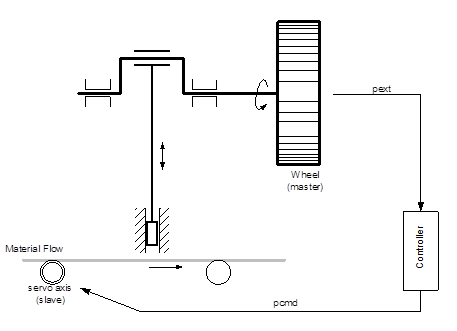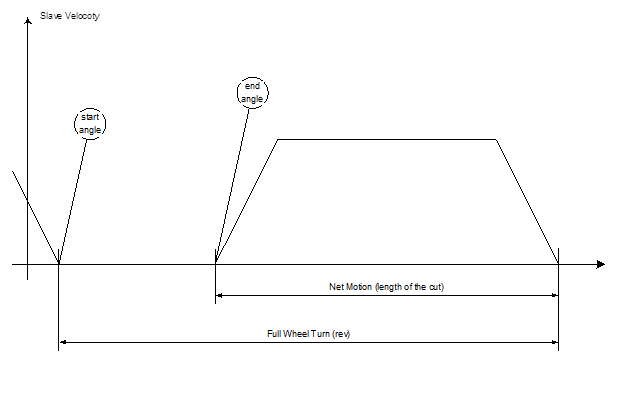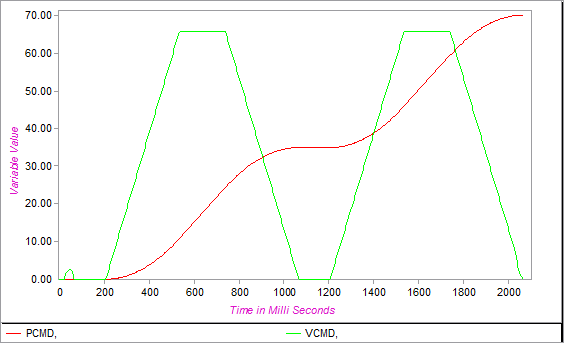Difference between revisions of "Cut To Length (Punching) Application"
| (One intermediate revision by the same user not shown) | |||
| Line 1: | Line 1: | ||
| − | {{Languages}} | + | {{Languages|Cut_To_Length_(Punching)_Application}} |
| − | = | + | = Introduction = |
| − | + | An eccentric press (crank press) is being feed by a servo-driven feeding device cammed to the angular position of the wheel. The wheel position is measured by an external feedback device (resolver, encoder, etc.) that is connected to a drive as an external position signal (PEXT). | |
| − | = | + | = Application Diagram = |
[[File:cut2len1.png]] | [[File:cut2len1.png]] | ||
| − | + | The angular position of the wheel is the master source signal that continuously increases during its operation. On each turn of the wheel, there is a start and end angle value where the feed axis should stop. | |
| − | = | + | = Motion profile = |
| − | + | The feed axis operation looks like: | |
[[File:cut2len2.png]] | [[File:cut2len2.png]] | ||
| − | + | The main task in building this application is to design a cam according to the following parameters: | |
| − | • | + | • Total wheel turn angle, value of pext needed for one full turn of the wheel. |
| − | • | + | • Start angle, wheel angle where the punching starts |
| − | • | + | • End angle, wheel angle where the material can be moved or when the punching ends. |
| − | • | + | • Length of the cut, the distance of slave position between the last end-angle to the next start-angle of the wheel. |
| − | • | + | • Maximum acceleration and velocity of the slave axis, these values can not be exceeded during camming. |
| − | + | An additional limitation is the decision to take velocity trapezoidal profile for the slave motion. Another profile could be taken, but the equations would differ. | |
| − | + | The wheel velocity is assumed to be constant and known for the computations. Now, to compute a motion profile from the given A, L, T values, see Appendix at end of example. | |
| − | = | + | = Program = |
<syntaxhighlight lang="vb"> | <syntaxhighlight lang="vb"> | ||
common shared c1 as cam | common shared c1 as cam | ||
| Line 171: | Line 171: | ||
''' | ''' | ||
| − | = | + | = Profile recording = |
| − | + | Two turns of the master wheel (cut length 20 mm): | |
[[File:cut2len4.PNG]] | [[File:cut2len4.PNG]] | ||
| − | + | A 35 mm length close to triangular profile: | |
[[File:cut2len5.png]] | [[File:cut2len5.png]] | ||
| − | = | + | = Computing velocity profile with known A, L, T = |
[[File:cut2len3.PNG]] | [[File:cut2len3.PNG]] | ||
Latest revision as of 15:36, 27 November 2017
| Language: | English • 中文(简体) |
|---|
Contents
Introduction
An eccentric press (crank press) is being feed by a servo-driven feeding device cammed to the angular position of the wheel. The wheel position is measured by an external feedback device (resolver, encoder, etc.) that is connected to a drive as an external position signal (PEXT).
Application Diagram
The angular position of the wheel is the master source signal that continuously increases during its operation. On each turn of the wheel, there is a start and end angle value where the feed axis should stop.
Motion profile
The feed axis operation looks like:
The main task in building this application is to design a cam according to the following parameters: • Total wheel turn angle, value of pext needed for one full turn of the wheel. • Start angle, wheel angle where the punching starts • End angle, wheel angle where the material can be moved or when the punching ends. • Length of the cut, the distance of slave position between the last end-angle to the next start-angle of the wheel. • Maximum acceleration and velocity of the slave axis, these values can not be exceeded during camming. An additional limitation is the decision to take velocity trapezoidal profile for the slave motion. Another profile could be taken, but the equations would differ. The wheel velocity is assumed to be constant and known for the computations. Now, to compute a motion profile from the given A, L, T values, see Appendix at end of example.
Program
common shared c1 as cam
dim shared toolong as error "The given cut length is too long for the given slave accel."
dim shared toofast as error "Slave axis can not move that fast"
' Shared profile parameters:..............................................
dim shared lprof as double ' total length
dim shared aprof as double ' acceleration used
dim shared vprof as double ' cruise velocity
dim shared t_acc_prof as double ' acceleration duration
dim shared t_dec_prof as double ' end of cruise phase
dim shared t_tot_prof as double ' total velocity trapeze duration
'.........................................................................
program
' Process data
dim sangle as double = 10 ' start to cut at this angle
dim eangle as double = 60 ' finish the cut at this angle
dim rev as double = 360 ' full turn of the wheel
dim Vwheel as double = 60 ' RPM - velocity of the wheel
dim CutLength as double = 20 ' mm of the slave motion
dim CutAngle as double
dim CutTime as double
dim i as long
' Variables used in cam computation
dim t as double
dim t_from_end as double
' Creating 1000 points in the cam
createcamdata 1000 c1
' Computing the next motion
CutAngle = rev - (eangle-sangle) ' The wheel passes this angel while it moves
CutTime = CutAngle/(Vwheel*360/60) ' Time needed to move to another cut (sec)
with A1
call ProfileLTA(CutLength,CutTime,Acc)
' Start computing the cam table
' t is relative time of velocity trapeze profile
for i = 1 to c1.size
c1.MasterData[i] = (i-1)*rev/c1.size ' Defining a uniform master axis
select case (c1.MasterData[i])
case is < sangle ' it is a rotary axis in cases when master < start
' we need to compute the relative time from the end
t_from_end = (sangle - c1.MasterData[i])/(Vwheel*360/60)
t = CutTime - t_from_end
c1.SlaveData[i] = VTProfile(t) - CutLength
case is <= eangle ' master is between start and end - no motion of slave:
c1.SlaveData[i] = 0.0
case is > eangle ' Time passed after exit [start,end] master segment
t = (c1.MasterData[i]-eangle)/(Vwheel*360/60)
c1.SlaveData[i] = VTProfile(t)
end select
next
end with
with A2
' Setup the cam table
c1.Cycle = -1 ' endless camming
Attach
FirstCam = c1
MasterSource = A1.Pcmd 'For example with 2 axes
' MasterSource = pext
GearRatio = 1
Slave = CAM
SlaveDisconnect = 0
En = ON
Detach
end with
Print "Cut to length Ready"
end program
' Velocity Trapeze pre-calculation routine
' Input: Length, Total time, max Accleration
' Global used: Vmax
sub ProfileLTA(byval L as double ,byval T as double, byval A as double)
dim sqr as double
with A1
aprof = A
sqr = T^2 - 4*L/A
select case (sqr)
case is < -0.004 ' less then 4ms
throw toolong
case is < 0
' In cases of numeric computation errors (high accel. values) this could be a small
' negative number. In order to avoid math error the value is cut to zero.
sqr = 0
case else
sqr = sqrt(sqr)
end select
vprof = 0.5*A*(T - sqr)
if vprof > vmax then
throw toofast
end if
' Compute fixed points in time (end of acceleration, begin of deceleration)
t_acc_prof = vprof/A
t_dec_prof = T - t_acc_prof
t_tot_prof = T
end with
end sub
'.................................................................................
' Velocity Trapeze gernal purpose profile function
' uses shared variables:
' t_acc - time where acceleration ends (cruise starts)
' t_dec - time where deceleration starts (cruise ends)
' t_tot - end of movement
' aprof - accleration/deceleration value
' vprof - cruise (max) velocity
' lprof - total movement length
function VTProfile(byval t as double) as double
select case(t)
case is <=0
VTProfile = 0
case is <= t_acc_prof
VTProfile = 0.5*aprof*t^2
case is <= t_dec_prof
VTProfile = 0.5*vprof^2/aprof + (t-t_acc_prof)*vprof
case is < t_tot_prof
VTProfile = lprof - 0.5*aprof*(t_tot_prof-t)^2
case else
VTProfile = lprof
end select
end function
Profile recording
Two turns of the master wheel (cut length 20 mm):
A 35 mm length close to triangular profile:


